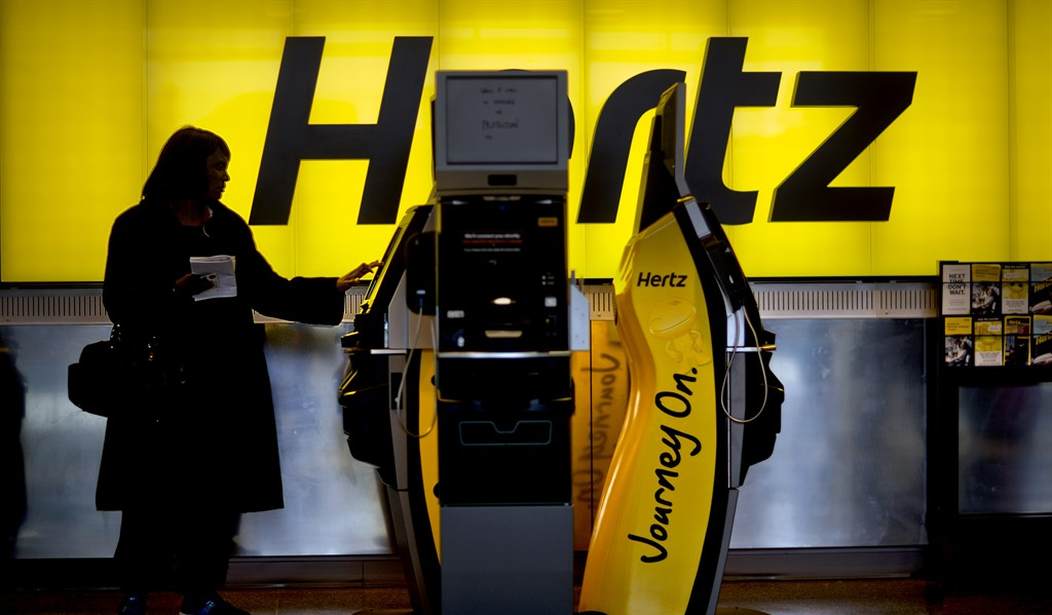Just a few months ago, Hertz committed to making electric vehicles a quarter of its rental fleet. They had already announced an intent to partner with Tesla as a major provider for their future fleet, which had pushed Tesla’s value even higher. Supposedly, the scale of the demand and usage would lower costs across the board and make fleet maintenance all that much easier for Hertz and other rental agencies.
Now, however, Hertz has hit reverse — and taken a big hit to its bottom line. Bloomberg reports today that the leading rental company wants to sell off a full third of its existing EVs and replace them with gasoline-powered vehicles:
Hertz Global Holdings Inc. plans to sell a third of its US electric vehicle fleet and reinvest in gas-powered cars due to weak demand and high repair costs for its battery-powered options. …
The dramatic about-face, after Hertz announced plans in 2021 to buy 100,000 Tesla Inc. vehicles, underscores the waning demand for all-electric cars in the US. EV sales growth slowed sharply over the course of 2023, rising just 1.3% in the final quarter as consumers were put off by high costs and interest rates.
“The elevated costs associated with EVs persisted,” Hertz Chief Executive Officer Stephen Scherr said in an interview. “Efforts to wrestle it down proved to be more challenging.”
This move doesn’t come cheap for Hertz, either. They will take a $245 million charge to its Q4 earnings as a depreciation hit. That may continue for a while, as it may take all year to sell off the used EVs in a market where demand for new EVs has dipped dramatically. That led to a sell-off this morning that saw Hertz’ share price drop 4.3% in the first hour of trading, and only bounce back to a net drop of 3.5% by mid-afternoon — and then slide again to a 4.55% drop later.
Hertz had thrown out warning signs that their bold EV strategy was failing, as Andrew Stuttaford points out at NRO. Last October, Bloomberg had reported that Hertz planned to slow down their acquisitions of Teslas for two reasons. First, the repair costs that were supposed to decline at fleet scope were instead still rising for EVs. More importantly, Tesla had begun slashing sales prices for new vehicles as demand had dropped off, which inverted the value of their fleet (emphasis Stuttaford’s):
Tesla has been rapidly dropping its prices to spur sales, which has lowered the resale value of the EVs in Hertz’s fleet by about one-third. Repair costs for EVs have also been higher than expected, about double what the company pays to fix damaged gasoline cars, Chief Executive Officer Stephen Scherr said in an interview Thursday.
Hertz will slow the pace of buying EVs while it learns how to manage costs, Scherr said. Hertz has 50,000 EVs currently, of which 35,000 are Tesla models. EVs account for about 11% of its total fleet.
Scherr said Hertz remains committed to buying 100,000 cars from Tesla and 175,000 EVs from General Motors Co., but the rental company won’t meet its goal to have EVs account for 25% of the fleet by the end of 2024, he said. The first order of business is to work with parts suppliers to lower repair costs. As EV prices settle, Hertz will buy more of them, he said.
That option appears to have expired with this announcement. It’s possible that Hertz might look for an EV supplier with lower prices, but Tesla’s already cut its MSRP. Perhaps the repair costs for GM EVs will be lower, but … does anyone who has owned a GM car believe that? Scherr says that GM will be a key part of their EV strategy moving forward, but if the problem was just Tesla, then why are they replacing these cars with traditional internal-combustion vehicles?
Hertz plans to use some of the money raised by selling off EVs to buy gas-powered vehicles. “The company expects this action to better balance supply against expected demand of EVs,” it said in the filing.
There is also the question of just how much money Hertz can raise in this sell-off. Tesla undercut the value of its used models with its sharp price reductions on new vehicles, but demand may not be the only problem in the secondary market. The maintenance costs that proved prohibitive for Hertz at fleet scale will be worse for consumers on an individual basis. Plus, with questions about battery life and charging infrastructure still acute for consumers, buyers may be leaning back to gas-powered vehicles for used cars too.
One has to wonder if the resale and maintenance costs are Hertz’ only issues with EVs, too. How enthusiastic were its customers to rent EVs? After all, most people rent cars for travel to other cities, where they have less knowledge of infrastructure and likely have little or no access to charging stations where they are lodging. There are still gas stations at almost every major intersection in American cities and suburbs, and refilling a tank takes a lot less time than recharging a battery — and that time matters on vacation as well as on business trips.
The truth is that EVs are a largely impractical choice for rentals as well as a more expensive option for the agencies. And as the nation’s largest car-rental company just found out, the truth Hertz.
But I bet their ESG score in 2023 was awesome, dudezzz.
Bloomberg’s analyst finds this reversal rather stunning, but Craig Trudell isn’t exactly surprised.







Join the conversation as a VIP Member